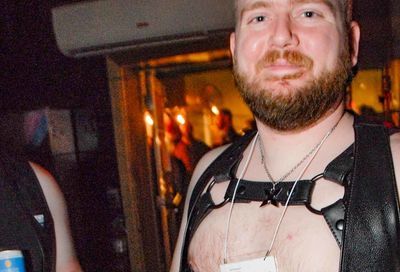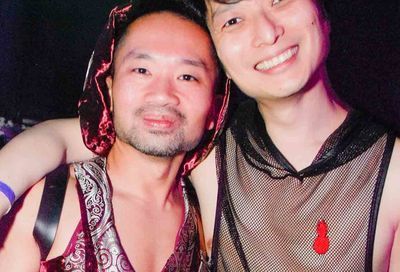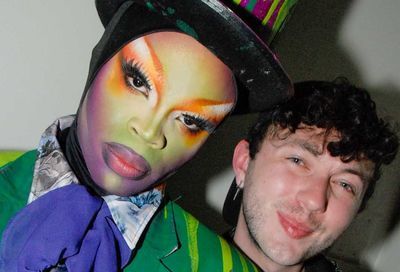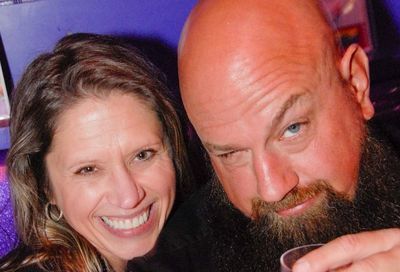James Alefantis: From Scratch
With two community-centric restaurants and support of various causes, James Alefantis is committed to the common good

Guy Fieri was skeptical of James Alefantis’ cooking skills.
“Guy comes in and he’s really nice,” Alefantis recounts of their first encounter five years ago. “But he’s looking at me a little bit like, ‘What’s this kid doing? How is this guy going to cook?'”
But Alefantis quickly won over the Food Network star during his visit to Comet Ping Pong. “We start making the clam pizza, making the dough. Then he sees me tie the pork, roast the pork for the calzone. He’s looking like, ‘Alright, you get it.’ He’s loving it.”
An understatement to be sure. In the episode of Diners, Drive-Ins and Dives that featured Comet, Fieri raved that the Yalie clam pizza and the Philly calzone churned out by Alefantis’ D.C. “dive” were “some of the best he’s ever had.” He also praised Alefantis for making his own tomato sauce. Fieri was even inspired by Comet’s wood-burning oven, imported from Italy and built on-site: “He’s built three ovens on his properties, just like mine.”
The appeal of Comet Ping Pong goes well beyond the pies and other menu items that are often slightly healthier yet hearty versions of standard Italian-American diner fare. Over the years, Comet has developed into “a kind of community center,” regularly hosting fundraisers for local schools and other causes. And in the back of the upper Connecticut Avenue restaurant you’ll regularly find groups of people playing friendly rounds of ping-pong.
Launched in 2006, Comet Ping Pong is Alefantis’ first restaurant in which he’s the executive chef, and only second as owner, after Buck’s Fishing & Camping — which he had opened roughly two years before, and two doors down Connecticut Avenue. But Alefantis, who turns 40 this year, has worked in restaurants since high school, including a stint in New York working at a Bobby Flay location. Prior to opening Buck’s, he had served two years as the general manager of Johnny’s Half Shell in Dupont Circle.
Alefantis, who briefly owned a small art gallery in Georgetown a decade ago, now serves as board president of Transformer, a contemporary art gallery in Logan Circle. His passion for the arts is reflected in both his restaurants, but notably Comet, which boasts a large mural of a blazing comet created by a collective of artists, this magazine’s Christopher Cunetto among them. His unabashed love of theater has lead him to sponsor several local theatrical productions, and he equates operating a restaurant with theatrical endeavors.
“Restaurants are a bit like theater,” he says. “Every day is like a new show. The interior is like a set. So it fulfills a lot of my desires.” But while he points out that “it’s fun to do projects that begin and end,” as most plays have a closing date, “a restaurant has no end.”
Over the years, Alefantis has also become well-known for his grass-roots philanthropy, though his approach is decidedly low-key.
“I try to support a lot of things in the community — usually schools and the arts, but some gay causes as well.” One such cause is Food and Friends’ Dining Out for Life. This year, both Buck’s and Comet will donate 50 percent of every bill to the cause.
“I think it’s important for gay people to support our community’s causes,” he says. “And I think it’s important for small businesses to support local organizations, too.”
Alefantis attributes his loose-limbed, casual outlook to his noncompetitive nature, a quality best exemplified by the game in Comet’s name. “I love ping-pong,” he says. “It’s not table tennis. You play to win, kind of, but you’re not trying to kill your opponent. You’re trying to have a good time.”

METRO WEEKLY: Buck’s Fishing & Camping became your first venture as restaurant owner, in a partnership with local celebrity chef/owner Carole Greenwood. When was this exactly and how did it come to be?
JAMES ALEFANTIS: I opened Buck’s in October of 2003. Carole and I conceptualized Buck’s together. She became the chef, I became the owner. We changed the name from Greenwood to Buck’s, but kept the commitment to art and artists, seasonality, community and a sort of communal table eating together. Carole and I have similar values when it comes to food, we kind of apply them in different ways. Buck’s is more community-oriented in a way. It’s a little bit more welcoming.
MW: Growing up, did you think that you might be in this business someday?
ALEFANTIS: I’ve always really loved restaurants, and I was always really interested in food and wine as a kid. My mother was a caterer part-time, so I would help her cook a lot.
Actually, when I was a kid I wanted to be a baker. I wanted to have a baker’s hat and wear an apron and make cakes and breads. But I never knew quite what I wanted to do.
MW: Did you grow up in D.C.?
ALEFANTIS: Yeah. I went to Georgetown Day School, down the street, which I also support a lot. I have their teacher receptions, auction things, I’m on the benefit committee. I won the alumni award — it was for Most Supportive of the School or something — two or three years ago.
MW: When did you come out to your family? Was that a struggle?
ALEFANTIS: I came out to my family in my early 20s. I was running Johnny’s. I was kind of out to some friends, had a boyfriend, and my relationship with my parents had deteriorated over a period of time in my early 20s when I was in New York and partying too much. Once back in D.C., as I was building my life and trying to figure out what I wanted to really become, I realized, as many people do, that in order to become a truer person, I had to be honest and out.
I took my mother and father to dinner at Pesce, and came out to them. In the past my father had asked me and I had lied. And I felt tremendous guilt about that for a year or two. But they were pretty supportive. My mother’s initial reaction was, “You always have to do things to get attention.” And my father was like, “We love you no matter what.”
MW: Professionally speaking, have you faced any challenges being openly gay as a chef or restaurateur?
ALEFANTIS: Coming out as a young adult had its challenges, but I think about 11 years ago when I opened Buck’s. I was out, but I was kind of closeted in the business world, where you have to meet with your landlord and your banker and your lenders and all those things. And you leave out a lot. You don’t personalize, or I didn’t then, because it was a different time. I was a little bit cagey in my business dealings at the beginning.
It’s such a privilege and an honor that we’ve all worked so hard, and the generation before us worked so hard, to get to a point where I can do an interview like this and not worry about its ramifications to me and the business. And it’s important for me, or for anyone who is kind of out there as a gay business owner, to be out and active and available to be role models.
MW: It’s interesting to hear you put it that way. It’s quite possible that a fair number of gay Washingtonians aren’t aware that Buck’s and Comet are gay-owned. I only learned of it recently.
ALEFANTIS: Oh really? Well, they are. [Laughs.] One of the ways that a restaurant is so fascinating is that it’s really not about me, it’s about everyone who works here in a way. I have 70 employees between the two places. And at any one moment, a couple of them might be gay. And it makes me really happy when that happens, because it’s a way of mutually supporting each other. But it’s also really interesting to be working with cooks who are from other countries — Gambia, Nigeria, El Salvador, Guatemala. And having them be like, this guy is just like me and he’s gay. And he’s out. And that’s okay.
A lot of my staff has worked for me for 10 years. My cooks at Comet have been there since I opened. And over those eight years I hope they’ve learned to respect me for who I am, and that being gay is part of who I am. There have been issues where a cook will call someone a maricón — fag, in Spanish — and I’ll come down really hard on that person. But kind of in the same way I would come down on an employee who said something racist. I’ve had incidents where we’ve had to remove people who don’t share our values. I really try to create an environment of extreme tolerance and diversity within these communities, and it’s really one of my missions and goals. It’s really nice to have black people and white people working together, gay people and straight people, Hispanics working with a Gambian guy. Particularly in terms of the strides we’ve made as Americans, where at least in urban areas, there’s much more tolerance, much more acceptance and great laws that have been put in place in many areas of the country. But then if you go to Africa or you go to El Salvador, or you go somewhere else, the protections are not there. So these are people who are from a different culture, who are able to maybe have a few examples of gay people who they like and respect.
MW: But as you just said, outside of major metropolitan areas America isn’t often a beacon on LGBT concerns. For example, I noticed in the bathroom lined with state plates at Buck’s, you have an Indiana plate front and center above the toilet.
ALEFANTIS: A customer just mentioned that the other day. You know, Indiana is a place in America. It’s unfortunate that they have leaders that are terrible people, but the gay citizens of Indiana are people, too. So we fight the battle to include, not to exclude. Indiana is where people live. We’re Americans. You can’t condemn them just because there are a few crazy leaders.
MW: You mentioned having a lot of employees who have worked for you since nearly the beginning. Why do you think people seem to like working for you, or that you have pretty low staff turnover?
ALEFANTIS: Oh, I hope that they do. I try and pay people a good wage. It takes a long time to train someone to do things as a chef, the way you want it done. And those people are really valuable people. And if you have those people for a long time, they usually share your values. Another thing we try and do here is create a community. So those people are a part of our community, and they share our values, and I show them respect because they are hardworking and talented. Mutual respect, good pay. I try and give people the schedule they want. But at this point it’s not just me. I have managers in place that are strong, good leaders too.
MW: What inspired you to open Comet Ping Pong?
ALEFANTIS: I had Buck’s, and there wasn’t a lot up here. There’s Politics and Prose, an amazing bookstore and an institution. And there was a Thai restaurant called the Thai Room — the first Thai restaurant in Washington. It had kind of gone downhill. It was known for its Thai food, but either our conception of Thai food changed, or their food changed — but anyway, they were there for 32 years. And then one day there was a For Lease sign on the outside, and they were closed. So I was like, “Oh, no! I’m going to have to open a restaurant there or else someone else is going to do it. And it’s my block.” It was just a couple years after I started Buck’s. It felt like I had been in Buck’s for a long time at that point, because it was like two years and I was exhausted. It was just grueling.
I ended up getting the space. At that time, it had been an open restaurant for 32 years, and I was like 31 or something, so that restaurant had been there for longer than I had been alive. This is a lot of responsibility. And then my friend Eric Hirshfield, who used to own Duplex Diner, was like, “I’m going to buy the Comet sign. You’re opening a restaurant, why don’t you take it?” And I thought, I should totally have that sign, and then I’ll have a name.
The Comet sign used to hang next to Cashion’s in Adams Morgan, over a liquor store and deli owned by Sid and his wife Beverly Drazin. They were there for a long time, and people really loved that place and had a lot of nostalgia for it. And they were really part of the community.
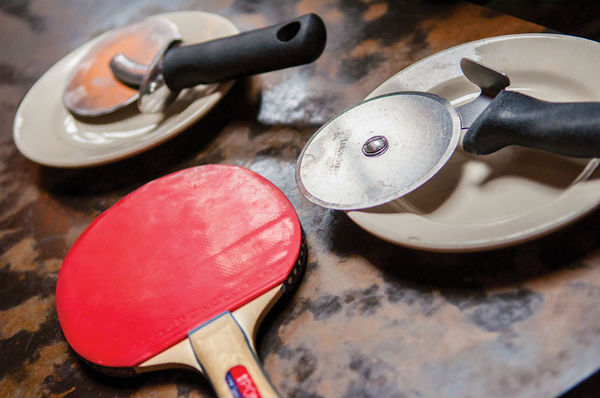
MW: So Comet Liquors essentially inspired the ethos of Comet Ping Pong, though not ping-pong itself. Where did that come from? Did you grow up with the game?
ALEFANTIS: Yeah, I loved ping-pong. We played it at my family’s lake cottage in upstate New York, because my parents are from outside of Buffalo.
I wanted a place that was really inclusive, where people would feel you could just jump in and play. You don’t have to be super-skilled. It’s for everyone. And it has the nostalgia. It reminds people of where they came from, or their childhood. I’ve seen kids born and now they’re starting to play ping-pong. They’re someday going to be like, “Oh, this is the place I went every Friday night with my dad, and it was so cool. I could run around, I could play ping-pong, and it had the best food — best sundaes, best pizza, whatever.”
MW: But as fundamental as it is now to the business, I understand you didn’t actually go in with a vision for a back room with ping-pong tables.
ALEFANTIS: Costs escalated so that I could only afford to renovate the front half of the building. So I thought, “What am I going to do with the whole back half? Well, I’ll put ping-pong tables in there, and then I can roll them away if I want to have a party or do something else back there. They’re not permanent.” But then that really informed my design decisions — like the ball lights, and the tabletops made out of old ping-pong tables.
I’m about making things from scratch. Comet’s wood-burning oven I imported from Italy, we built it on site. We built everything from scratch on site. It took way too long — it was like a year and a half in construction, every day. Every detail. Custom-building those light fixtures.
MW: When did you decide that the back room could also double as a makeshift, DIY-esque concert venue?
ALEFANTIS: That started happening because when we first opened Comet, no one came. So we were trying to do anything we could. So we would have parties and have bands. And then we found out we were operating outside of our license for that. [Laughs.] So we went and got a music license, and suddenly there were all these cool bands that wanted a smaller venue, and so we could have them here. There are not a lot of opportunities for that in Washington. And also it fits with our commitment to communities. So D.C.’s old punk rock scene is here all the time — members of Fugazi, Bad Brains. Mary Timony of Ex Hex, she’s at Comet all the time — also, she’s a music teacher, so she does a showcase of her students twice a year where we do a daytime rock and roll show.
So basically that started out as anything we could do to stay in business. And now we’ve become a kind of community center. We host fundraisers for local schools. And I do partnering events with Politics and Prose, which are more high-end, seated dinners.
MW: You’ve cooked for some culinary heavy-hitters at those dinners, including Alice Waters of Chez Panisse and David Tanis, a former chef at Chez Panisse. Those must have been nerve-wracking.
ALEFANTIS: Yeah, it’s crazy. Actually, David Tanis was my most nerve-wracking, because he’s one of my chef heroes. His cookbooks are so important to me, and his column in the New York Times is so important to me. I read it every week, we think about it, it becomes part of our vernacular. Alice is honestly my friend now, because I’ve known her for years. Every time she comes to town, she always comes here.
Waters, and in some ways Gabrielle Hamilton [chef/owner of Prune in New York], were kind of the inspiration for a restaurant like this to exist. You have a real commitment to the seasons, a real commitment to the farmers, a real commitment to the community. And it’s really independent. Alice only owns one restaurant, you know what I mean? But when she talks about it, she’s like, “I’m creating a revolution.” The revolution is everything: how people eat, where your food comes from, who is respected in your community. She was like a mentor to me.
MW: Meanwhile, another celebrity chef was helpful in putting Comet on the map — Guy Fieri, who filmed an episode of his popular Food Network show Diners, Dive-Ins and Dives there five years ago.
ALEFANTIS: It’s so crazy. We had been open a few years by then. It took forever for Comet to be figured out. People were like, “You’re just a beer bar.” They didn’t appreciate what we were doing with the food right away. And I was honestly a little bit nervous. Because I had Buck’s, which had gotten good reviews. And I was young, and nervous to put myself out there. At Comet I was the chef, and I was thinking, “What if people don’t like my pizza?” So I didn’t really do anything, I didn’t really tell anyone.
Then the Food Network called, and I thought, “Oh, this will be cool, we’ll do it.” I didn’t really know the show even. His producers said, “You need to close for a day. These are all the requirements.” We filmed all day for two days. And as we’re cooking, they’re like, “You make this?” I said, “Yeah, what do you mean?” And they say, “You know, this is the best restaurant we’ve ever done.”

MW: What was it they couldn’t believe you had made?
ALEFANTIS: Well, we make everything from scratch. Other restaurants, even good restaurants, will, like, not roast their own peppers. You can just buy the roasted peppers in a can. Or you can buy garlic oil. Some products you can get, and they’re consistent and they’re easy. But I didn’t even know that existed actually until they said that. I was like, “What do you mean? There’s another way? You can just buy these things?” Because a lot of restaurants will open a can and put it on. Like our sauce — we harvest a whole crop of organic tomatoes — 10 tons of tomatoes every year. Can them all, store them in the basement, have like a harvest party when it gets loaded in.
Guy was very enthusiastic. We had a really great long segment, and it aired, and we had a viewing party. The next day I’m exhausted, I come late, and there’s literally a line from the front of the restaurant, down and around the corner.
MW: That had not happened before?
ALEFANTIS: I mean, sometimes we’d have a few people waiting. We open at 5. By 6, we may have a wait. This was 200 people standing in line. And it was like that for a week and a half. And they’re all ordering the same things, exactly what was on TV. And people drove in from Ohio, New Jersey, Florida. “We saw you on TV yesterday. We got in our car and drove overnight to come have your pizza.” But it also introduced us to a lot of Washington people. And now Comet is consistently busy with tons of the same people.
And also the Food Network just came back, a month ago. It was a one-day shoot for their favorite places from all the shows. Like five- or six-minute segments. So it’s like a full Comet segment with me cooking that’s going to air all over the place next month.
MW: I guess you’d better prepare for that.
ALEFANTIS: I know. The New York producer was like, “James, you need to open another Comet before this airs.” And I said, “When is it airing? May. I don’t have time to do that.”
MW: Are you considering that though, opening another Comet?
ALEFANTIS: A lot of people have approached me and talked to me about it. And a lot of people want it. Oh, I was just in this college town in Colorado. A Comet would be awesome there.” I do think it would make a lot of communities happy, because it’s a great gathering place. And everything is about fast-casual now — people just want to get in and get out. But I really think that there is a need to have somewhere to go with your friends to sit down and hang out for an hour or an hour and a half, and have good food.
I also believe in value. You should be able to go out to eat and not be gouged. The job of a restaurant is not to extricate as much money as possible from you over a certain amount of time, and then have you leave. We try not to rush people. Even like casual restaurants now, or these small-plates places, you end up spending $50, $70 a person and you didn’t even notice it and you didn’t really have anything. And you’ve been there for an hour and a half. [Laughs.] Whereas Comet you can have legitimately good food, good for you, sourced from a farm, fresh and healthy, and yet it’s still affordable.
MW: Do you have another restaurant concept in the works?
ALEFANTIS: No, I’m not working on another restaurant right now, at all. I feel like it’s hard enough to do these things, and it’s important to be committed to them. And after almost 12 years, I’m kind of able to do other things too. And to do something bigger, you have to delegate better than I’m capable of doing. I have looked in a lot of locations, but so far nothing has stuck with me. It’s also a really big commitment opening a restaurant as an independent businessman. A lot of restaurants these days are run by groups of people — like four brothers, and they can all do their own thing. For me, if I can hold on to what I have, I’m happy enough.
MW: And your brother is not involved with the restaurants, right?
ALEFANTIS: No, my brother I think wouldn’t mind it. But he isn’t. He has a wife and a kid. I think also being gay, you have a little bit more freedom. You’re taught at the beginning that you can be your own person, so take a risk. You’ve already taken so many risks, you’re like, “Let’s just do another one.” [Laughs.] Like when I opened Buck’s, people were saying, “You’re opening a restaurant? You’re so crazy! What if you fail?” And I was 27. “What do you mean, fail? I’m just opening a restaurant. It’s going to be great. It’s going to be awesome.” And luckily so far that’s turned out to be the case, but you never know. So now I’m thinking, “Opening another restaurant? That’s really risky. What if you fail?” [Laughs.] And also now it’s gotten really expensive, building things in Washington. Every time I look at a space, we get a quote for it, it’s $1 million at least. Usually it’s $1.5 million. I’m like, “To build a pizza dive?”
People are doing great work where they’re doing it. There’s a lot of Comet wannabe restaurants around this town as it is. Comet-inspired restaurants. It’s great, it’s great.
MW: Do you have time for a personal life? Do you have a significant other?
ALEFANTIS: I do have time for a personal life. I make time. At the moment, I’m single. But I date. I had a 10-year partner starting Buck’s. That was helpful because you could work all the time because you’re in a relationship, especially if you’re in a relationship with someone else who wants to work on their own things all the time. So that was nice getting started. I’m dating someone now. Who’s adorable! And so nice. But he lives in New York, so it’s a problem.
MW: You wouldn’t move back to New York even for love?
ALEFANTIS: No, no way. New York is great to visit, but Washington is a great place to live.
Buck’s Fishing and Camping is located at 5301 Connecticut Ave. NW. For reservations, call 202-364-0777 or visit bucksfishingandcamping.com.
Comet Ping Pong is located at 5307 Connecticut Ave. NW. Call 202-364-0404 or visit cometpingpong.com.
Support Metro Weekly’s Journalism
These are challenging times for news organizations. And yet it’s crucial we stay active and provide vital resources and information to both our local readers and the world. So won’t you please take a moment and consider supporting Metro Weekly with a membership? For as little as $5 a month, you can help ensure Metro Weekly magazine and MetroWeekly.com remain free, viable resources as we provide the best, most diverse, culturally-resonant LGBTQ coverage in both the D.C. region and around the world. Memberships come with exclusive perks and discounts, your own personal digital delivery of each week’s magazine (and an archive), access to our Member's Lounge when it launches this fall, and exclusive members-only items like Metro Weekly Membership Mugs and Tote Bags! Check out all our membership levels here and please join us today!




















